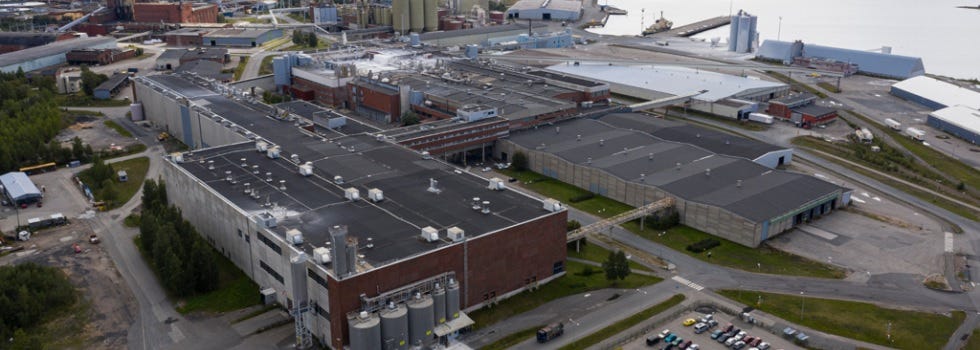#49 Infinited Fiber
Making endless new cotton from textile waste
Read time: 5 minutes
Hi, I’m Javi Gascón.
This is Climate Tech Distillery, a newsletter where I talk about one specific climate tech company every week.
Subscribe for free to receive my weekly articles in your inbox.
Today we’ll distill a company that’s turning discarded clothes into infinite and new, high-quality fibers: Infinited Fiber 🇫🇮
Want to sponsor Climate Tech Distillery? Here’s all the info.
What Problem Does Infinited Fiber Tackle❓
You guessed it, the problem of textile waste. They particularly focus on the issues associated with the end-of-life cycle of clothing and the inefficiencies in textile recycling.
1. Volume: The fashion industry produces around 92 million tonnes of textile waste annually, with 80+ million of those ending up in landfills/incinerated each year. That’s one full garbage truck every second.
2. Consumer Behavior: Fast fashion encourages frequent purchases and disposals, with the average lifespan of clothing items decreasing significantly.
3. Recycling Inefficiencies: Only about 8% of old clothes are reused, and just 10% are recycled globally. Less than 1% of clothing waste is recycled into new clothes due to the challenges existing recycling systems face.
4. Environmental Impact: The textile industry is responsible for 10% of global greenhouse gas emissions and 20% of global water waste. It also contributes significantly to water and microplastic pollution.
Product / Service 📦
To fight this, Infinited Fiber created a product known as Infinna™. A premium-quality textile fiber produced from cellulose-rich textile waste. The process works like this:
Clean and separate cellulose.
Break it down molecularly.
Activate it with urea to create a powder.
Dissolve the powder into a liquid.
Wet-spin it into new regenerated cellulose fibers.
Their business model consists of licensing their tech to textile/fiber manufacturers who want to produce Infinna. They help the partners set up and operate the facilities and then earn royalties and fees from them. They also sell the fiber themselves.
Quality and Versatility: The fiber looks and feels like cotton, making it suitable for a wide range of textile applications, including denim, single jersey, and home textiles like curtains and bedsheets.
Efficiency: Producing Infinna™ saves up to 20,000 liters of water per kilogram compared to cotton production and reduces the use of chemicals, dyestuff, and energy.
Endless Flexibility: They use textile waste as raw material but their tech can produce the same, high-quality fiber from a wide range of other cellulose-rich inputs, such as used cardboard, paper, and wheat or rice straw.
Sustainability: They reduce the need for virgin raw materials and the environmental impact of textile production and also avoid all the textile waste disposal problems. They also eliminate the need for really dangerous chemicals used in conventional production.
They basically created a textile-to-textile recycling technology for true circularity!
Market 🌐
The circular fashion market is expected to grow at a CAGR of 8.5% from 2025 to 2030. It makes sense. Think about increasing regulations, brand commitments, consumer demand for sustainable fashion, etc.
Fashion overall is growing and sustainable fashion is growing even more so it makes sense that Infinited Fiber is booming.
Other Key Players
Recover 🇪🇸: Uses mechanical recycling to break down cotton textile waste into fibers that can be respun into new yarns, specializing in a low-impact mechanical process.
CYCLO Recycled Fibers 🇻🇳: Focuses on converting plastic bottles into recycled polyester fiber through chemical recycling, primarily serving the synthetic fiber market.
EVRNU 🇺🇸: Engineered a chemical recycling platform that can separate and transform mixed-fiber textile waste into various new engineered fibers, offering flexibility in both input materials and output fiber types.
Founding Story 🦄
Infinited Fiber was founded in 2016 by Petri Alava and research professor Ali Harlin. The origins of the technology date back to the mid-1990s at the Finnish Technical Research Centre VTT, where scientists began experimenting with turning waste materials like textiles, cardboard, and agricultural waste into high-quality textile fibers.
Petri Alava, with over 15 years of CEO experience in various industries, was drawn to this technology after turning 50 and seeking to contribute to sustainability. He was particularly attracted to this innovation because it addressed multiple aspects of sustainability challenges. Harlin had spent decades researching and teaching at the VTT, so it was a match made in heaven.
Alava and Harlin developed the patented technology that transforms cellulose-rich waste into Infinna™ and in only 9 years their achievements are impressive…
They have signed multi-year purchase agreements with Zara, Patagonia, H&M and others worth hundreds of millions of euros. They’ve also raised over €84M and they’re building a €400M flagship factory in Finland.
Top Impact Stats 📈
1. Their fiber production creates around 1.5kg of CO2 emissions per kg of fiber, compared to 4.7kg for virgin cotton (68% less).
2. The process uses 97% less water compared to virgin cotton production.
3. A single Infinited Fiber factory can process about 40,000 tonnes of textile waste annually, which is equivalent to the textile waste of about 4.7 million people each year.
Whenever you’re ready, there are 2 ways I can help you:
Scale and optimize your climate business: I build low-code automation systems for climate companies so they can free up time to scale their revenues and their climate impact.
Give visibility to your climate company: Get your company in front of an audience of thousands of climate players and enthusiasts by sponsoring newsletter issues and LinkedIn posts.
Thanks for reading today’s issue! If you liked it feel free to hit the ❤️ button and share it with someone who might like it too. See you next Saturday :)










